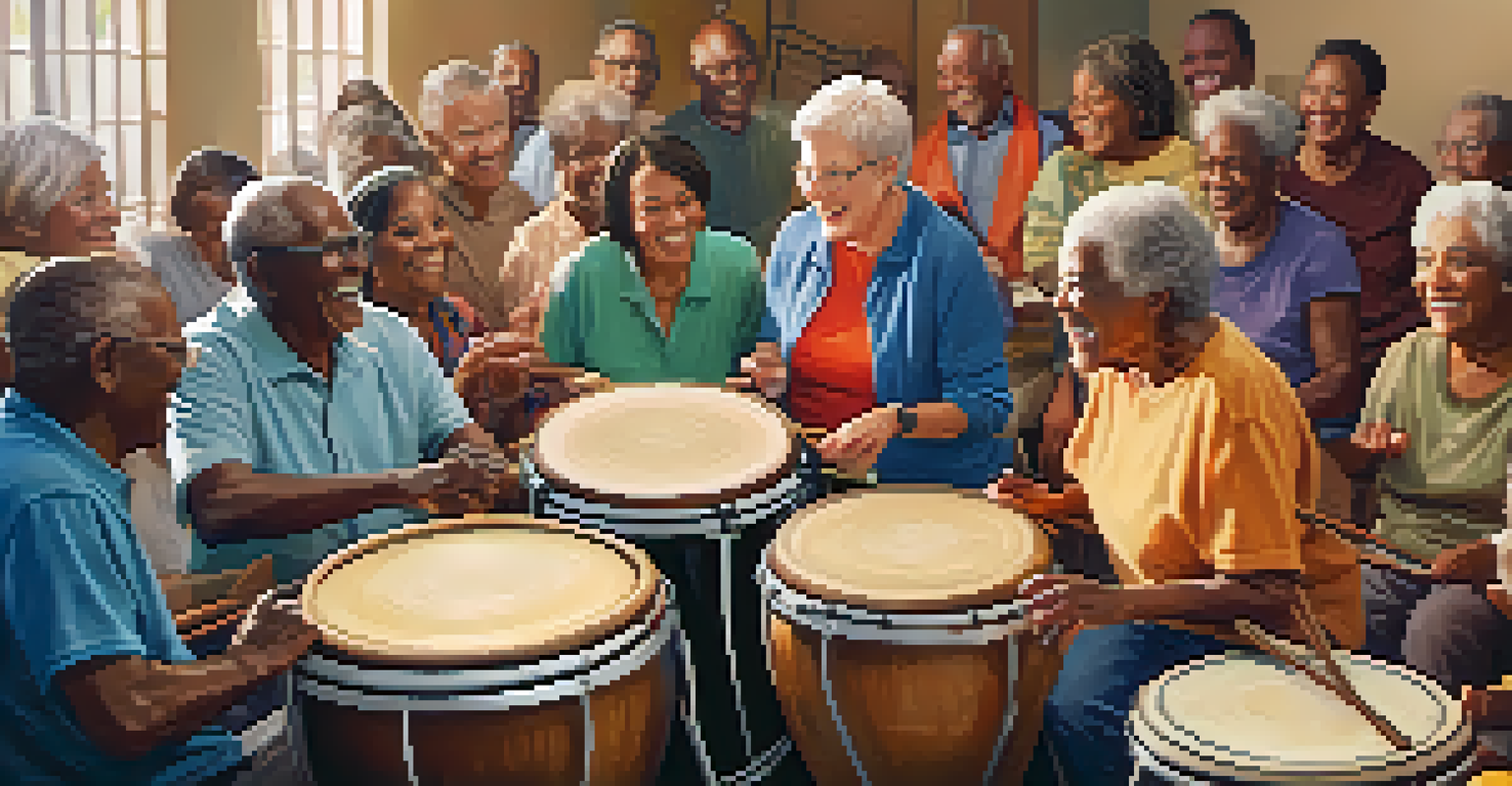The Science Behind Music's Effect on Aging and Health

Understanding Music's Role in Human Health
Music has been an integral part of human culture for centuries, acting as a medium for expression and connection. Recent research highlights its significant impact on our health and well-being. From soothing stress to enhancing cognitive functions, music's influence extends far beyond mere entertainment.
Music can change the world because it can change people.
Engaging with music can activate various brain regions, promoting neuroplasticity, which is essential for learning and memory. This is particularly beneficial as we age, helping combat cognitive decline. For instance, listening to familiar tunes can evoke memories and emotions, making it a powerful tool for those facing memory-related challenges.
Moreover, music therapy has gained recognition in clinical settings. It’s used to support patients dealing with chronic illnesses, mental health issues, and rehabilitation, showcasing the profound connection between music and physical health.
How Music Affects Our Brain Chemistry
When we listen to music, our brain releases neurotransmitters such as dopamine and serotonin. These chemicals play a key role in regulating mood, motivation, and pleasure. This is why a good song can lift our spirits or even help us process grief.

Research indicates that music can lower cortisol levels, reducing stress and anxiety. For older adults, managing stress is crucial as chronic stress can accelerate aging and lead to various health issues. By creating a calming environment with music, we can promote relaxation and a sense of peace.
Music Enhances Health and Well-being
Engaging with music can improve mood, reduce stress, and enhance cognitive functions, making it a valuable tool for health.
Additionally, music can enhance our immune response. Certain studies show that people who listen to music regularly have higher levels of antibodies, which play a vital role in fighting off illness. This creates a positive feedback loop, where improved health encourages more engagement with music.
Music and Memory: A Connection Worth Exploring
Memory and music are closely intertwined, especially in the context of aging. Many individuals with dementia or Alzheimer’s disease can recall songs from their past even when they struggle with other memories. This phenomenon underscores music's unique ability to evoke emotional responses and memories.
Where words fail, music speaks.
For caregivers and family members, using music can be a powerful tool to connect with loved ones suffering from memory loss. Playing their favorite tunes may spark recognition and joy, fostering meaningful interactions. It’s a gentle way to bridge communication gaps that often arise with cognitive decline.
In rehabilitation settings, music is used to help patients recover their speech and cognitive functions. The rhythmic elements of music can stimulate neural pathways that may have been damaged, showcasing how music serves as a bridge to memory restoration and emotional well-being.
The Benefits of Group Music Activities
Participating in group music activities, such as choirs or drumming circles, can significantly enhance social connections among older adults. These shared experiences foster a sense of belonging and community, which is vital for emotional health. Loneliness and isolation can have detrimental effects on aging, making social engagement even more critical.
Studies have shown that group music-making can lead to improved mood and reduced feelings of depression. The shared joy of creating music together not only uplifts spirits but also promotes teamwork and collaboration. This camaraderie can be incredibly beneficial, especially in senior living communities.
Music Therapy Aids Recovery
Music therapy provides emotional support and promotes healing for individuals dealing with chronic pain and mental health challenges.
Moreover, group activities can provide a sense of purpose. Engaging in music as a collective effort allows individuals to contribute their talents while forming lasting friendships. This sense of accomplishment can boost self-esteem and overall quality of life.
Music's Influence on Physical Health and Movement
Music can serve as a motivator for physical activity, which is essential for maintaining health as we age. Whether it's dancing, walking, or exercising, the right playlist can energize individuals and make movement enjoyable. This is crucial, as regular physical activity can lead to improved cardiovascular health and enhanced mobility.
Research has shown that rhythmic music can help improve coordination and balance in older adults. This is particularly valuable in preventing falls, a common concern for seniors. By integrating music into exercise routines, individuals can enhance their physical capabilities while having fun.
Additionally, music has been found to alleviate pain and discomfort during physical rehabilitation. Patients listening to music while undergoing therapy often report lower levels of pain and a more positive experience. This demonstrates how music can be an ally in maintaining physical health and improving recovery outcomes.
Exploring the Therapeutic Uses of Music
Music therapy is a growing field that utilizes the power of music to address various health issues. Certified music therapists employ techniques tailored to each individual's needs, promoting relaxation, emotional expression, and cognitive engagement. This personalized approach can lead to significant improvements in overall well-being.
For those dealing with chronic pain or mental health challenges, music therapy provides a creative outlet for expression. It encourages individuals to explore their emotions in a safe environment, helping them process experiences they may find difficult to articulate. The therapeutic benefits of music extend to individuals of all ages and backgrounds.
Group Music Activities Foster Connection
Participating in group music activities enhances social connections, combats loneliness, and boosts overall emotional health.
Moreover, music therapy has shown promise in palliative care, offering comfort and support to those facing life-limiting illnesses. By creating a soothing atmosphere, music can enhance the quality of life for patients and their families, making difficult times a little easier.
Final Thoughts: Embracing Music for Lifelong Health
The intersection of music, aging, and health is rich with possibilities. By embracing music in our daily lives, we can tap into its numerous benefits, from improved mood to enhanced cognitive function. It’s a simple yet impactful way to nurture our well-being as we age.
Whether you're enjoying a favorite song, participating in a music group, or utilizing music therapy, the key is to stay engaged. Music is not just a form of entertainment; it's a powerful tool that can enrich our lives and support our health.

As we continue to explore the science behind music's effects, let us celebrate the melodies that uplift us and the rhythms that inspire us. By making music a part of our aging journey, we can foster a healthier, happier life.